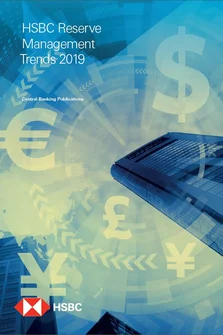Foreword
Christian Déséglise
Foreword
Foreword
The cashless society?
Executive summary
Trends in reserve management: 2019 survey results
Implementing a corporate bond portfolio: lessons learned at the NBP
Sovereigns and ESG: Is there value in virtue?
A methodology to measure and monitor liquidity risk in foreign reserves portfolios
Reserve management: A governor’s eye view
How Singapore manages its reserves
Appendix 1: Survey questionnaire
Appendix 2: Survey responses and comments
Appendix 3: Reserve statistics
What a difference a year makes! Early last year, investor sentiment was running high. The IMF was hailing “the broadest synchronised global growth upsurge since 2010”. The path of steady monetary policy tightening looked assured in the US. The UK seemed to be following suit and the European Central Bank had started reducing its net asset purchases.
Within a few months, however, a combination of trade and geopolitical tensions, the rise of populism in Europe, and mounting uncertainty around Brexit altered sentiment drastically. The Chinese economy displayed worrying signs of weakness. The economy slowed down in Europe and US growth did not meet expectations. Earnings started being under pressure and volatility picked up. As a result, developed markets Central Banks have now changed their monetary policy tack. But with little ammunition, their capacity to act forcefully should the situation truly deteriorate is being questioned.
The prevailing uncertainties are unlikely to recede soon. With a crucial US presidential election only twenty months away, we should expect continued politically-induced volatility to reverberate across global markets. Europe is also having its fair share of political drama, which will play out around Brexit and the upcoming European elections.
In this uncertain context, reserve managers will prioritise prudence. In a world where multilateralism is ebbing, there will be continued reliance on large reserves as self-insurance along with reduced risk appetite and caution not to deviate meaningfully from benchmarks.
A few themes are likely to continue to unfold in the near future. Geopolitical factors could continue to find their way into reserve management, as was illustrated by some significant changes in currency allocation, the gradual rise of the RMB as a reserve currency and a renewed interest in gold.
Another theme which has been gaining momentum is the integration of Environmental, Social and Governance (ESG) factors in the management of reserves as well as the role of Central banks in fostering green investments and including climate-related financial risk assessments in supervisory and macro-prudential policies.
Finally, technology is, of course, ever more pervasive. As reserve managers strive for greater efficiency in managing their portfolios, we see increased interest and adoption of solutions such as algorithmic trading to enhance performance and risk management.
HSBC were proud to receive the inaugural Central Banking Global Markets Award in 2019. We are determined to continue to merit the trust of our Central banking clients in the future. We are delighted to continue our sponsorship of this publication, which we hope will again provide you with pertinent insights into topical and evolving trends in reserve management.
Christian Déséglise,
Global Head of Central Banks and Reserve
Managers, HSBC
Only users who have a paid subscription or are part of a corporate subscription are able to print or copy content.
To access these options, along with all other subscription benefits, please contact info@centralbanking.com or view our subscription options here: http://subscriptions.centralbanking.com/subscribe
You are currently unable to print this content. Please contact info@centralbanking.com to find out more.
You are currently unable to copy this content. Please contact info@centralbanking.com to find out more.
Copyright Infopro Digital Limited. All rights reserved.
As outlined in our terms and conditions, https://www.infopro-digital.com/terms-and-conditions/subscriptions/ (point 2.4), printing is limited to a single copy.
If you would like to purchase additional rights please email info@centralbanking.com
Copyright Infopro Digital Limited. All rights reserved.
You may share this content using our article tools. As outlined in our terms and conditions, https://www.infopro-digital.com/terms-and-conditions/subscriptions/ (clause 2.4), an Authorised User may only make one copy of the materials for their own personal use. You must also comply with the restrictions in clause 2.5.
If you would like to purchase additional rights please email info@centralbanking.com











